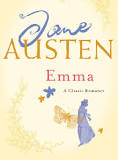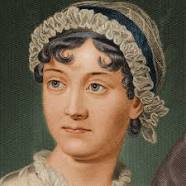Emma Page #11
Emma, by Jane Austen, is a novel about youthful hubris and the perils of misconstrued romance. The story takes place in the fictional village of Highbury and the surrounding estates of Hartfield, Randalls, and Donwell Abbey and involves the relationships among individuals in those locations consisting of "3 or 4 families in a country village". The novel was first published in December 1815 while the author was alive, with its title page listing a publication date of 1816. As in her other novels, Austen explores the concerns and difficulties of genteel women living in Georgian–Regency England; she also creates a lively comedy of manners among her characters and depicts issues of marriage, gender, age, and social status.
“Great has been the pleasure, I am sure. I never met with a disposition more truly amiable.” “I have no doubt of it.” And it was spoken with a sort of sighing animation, which had a vast deal of the lover. She was not less pleased another day with the manner in which he seconded a sudden wish of hers, to have Harriet's picture. “Did you ever have your likeness taken, Harriet?” said she: “did you ever sit for your picture?” Harriet was on the point of leaving the room, and only stopt to say, with a very interesting naivete, “Oh! dear, no, never.” No sooner was she out of sight, than Emma exclaimed, “What an exquisite possession a good picture of her would be! I would give any money for it. I almost long to attempt her likeness myself. You do not know it I dare say, but two or three years ago I had a great passion for taking likenesses, and attempted several of my friends, and was thought to have a tolerable eye in general. But from one cause or another, I gave it up in disgust. But really, I could almost venture, if Harriet would sit to me. It would be such a delight to have her picture!” “Let me entreat you,” cried Mr. Elton; “it would indeed be a delight! Let me entreat you, Miss Woodhouse, to exercise so charming a talent in favour of your friend. I know what your drawings are. How could you suppose me ignorant? Is not this room rich in specimens of your landscapes and flowers; and has not Mrs. Weston some inimitable figure-pieces in her drawing-room, at Randalls?” Yes, good man!--thought Emma--but what has all that to do with taking likenesses? You know nothing of drawing. Don't pretend to be in raptures about mine. Keep your raptures for Harriet's face. “Well, if you give me such kind encouragement, Mr. Elton, I believe I shall try what I can do. Harriet's features are very delicate, which makes a likeness difficult; and yet there is a peculiarity in the shape of the eye and the lines about the mouth which one ought to catch.” “Exactly so--The shape of the eye and the lines about the mouth--I have not a doubt of your success. Pray, pray attempt it. As you will do it, it will indeed, to use your own words, be an exquisite possession.” “But I am afraid, Mr. Elton, Harriet will not like to sit. She thinks so little of her own beauty. Did not you observe her manner of answering me? How completely it meant, 'why should my picture be drawn?'” “Oh! yes, I observed it, I assure you. It was not lost on me. But still I cannot imagine she would not be persuaded.” Harriet was soon back again, and the proposal almost immediately made; and she had no scruples which could stand many minutes against the earnest pressing of both the others. Emma wished to go to work directly, and therefore produced the portfolio containing her various attempts at portraits, for not one of them had ever been finished, that they might decide together on the best size for Harriet. Her many beginnings were displayed. Miniatures, half-lengths, whole-lengths, pencil, crayon, and water-colours had been all tried in turn. She had always wanted to do every thing, and had made more progress both in drawing and music than many might have done with so little labour as she would ever submit to. She played and sang;--and drew in almost every style; but steadiness had always been wanting; and in nothing had she approached the degree of excellence which she would have been glad to command, and ought not to have failed of. She was not much deceived as to her own skill either as an artist or a musician, but she was not unwilling to have others deceived, or sorry to know her reputation for accomplishment often higher than it deserved. There was merit in every drawing--in the least finished, perhaps the most; her style was spirited; but had there been much less, or had there been ten times more, the delight and admiration of her two companions would have been the same. They were both in ecstasies. A likeness pleases every body; and Miss Woodhouse's performances must be capital. “No great variety of faces for you,” said Emma. “I had only my own family to study from. There is my father--another of my father--but the idea of sitting for his picture made him so nervous, that I could only take him by stealth; neither of them very like therefore. Mrs. Weston again, and again, and again, you see. Dear Mrs. Weston! always my kindest friend on every occasion. She would sit whenever I asked her. There is my sister; and really quite her own little elegant figure!--and the face not unlike. I should have made a good likeness of her, if she would have sat longer, but she was in such a hurry to have me draw her four children that she would not be quiet. Then, here come all my attempts at three of those four children;--there they are, Henry and John and Bella, from one end of the sheet to the other, and any one of them might do for any one of the rest. She was so eager to have them drawn that I could not refuse; but there is no making children of three or four years old stand still you know; nor can it be very easy to take any likeness of them, beyond the air and complexion, unless they are coarser featured than any of mama's children ever were. Here is my sketch of the fourth, who was a baby. I took him as he was sleeping on the sofa, and it is as strong a likeness of his cockade as you would wish to see. He had nestled down his head most conveniently. That's very like. I am rather proud of little George. The corner of the sofa is very good. Then here is my last,”--unclosing a pretty sketch of a gentleman in small size, whole-length--“my last and my best--my brother, Mr. John Knightley.--This did not want much of being finished, when I put it away in a pet, and vowed I would never take another likeness. I could not help being provoked; for after all my pains, and when I had really made a very good likeness of it--(Mrs. Weston and I were quite agreed in thinking it very like)--only too handsome--too flattering--but that was a fault on the right side”--after all this, came poor dear Isabella's cold approbation of--“Yes, it was a little like--but to be sure it did not do him justice. We had had a great deal of trouble in persuading him to sit at all. It was made a great favour of; and altogether it was more than I could bear; and so I never would finish it, to have it apologised over as an unfavourable likeness, to every morning visitor in Brunswick Square;--and, as I said, I did then forswear ever drawing any body again. But for Harriet's sake, or rather for my own, and as there are no husbands and wives in the case at present, I will break my resolution now.” Mr. Elton seemed very properly struck and delighted by the idea, and was repeating, “No husbands and wives in the case at present indeed, as you observe. Exactly so. No husbands and wives,” with so interesting a consciousness, that Emma began to consider whether she had not better leave them together at once. But as she wanted to be drawing, the declaration must wait a little longer.
Translation
Translate and read this book in other languages:
Select another language:
- - Select -
- 简体中文 (Chinese - Simplified)
- 繁體中文 (Chinese - Traditional)
- Español (Spanish)
- Esperanto (Esperanto)
- 日本語 (Japanese)
- Português (Portuguese)
- Deutsch (German)
- العربية (Arabic)
- Français (French)
- Русский (Russian)
- ಕನ್ನಡ (Kannada)
- 한국어 (Korean)
- עברית (Hebrew)
- Gaeilge (Irish)
- Українська (Ukrainian)
- اردو (Urdu)
- Magyar (Hungarian)
- मानक हिन्दी (Hindi)
- Indonesia (Indonesian)
- Italiano (Italian)
- தமிழ் (Tamil)
- Türkçe (Turkish)
- తెలుగు (Telugu)
- ภาษาไทย (Thai)
- Tiếng Việt (Vietnamese)
- Čeština (Czech)
- Polski (Polish)
- Bahasa Indonesia (Indonesian)
- Românește (Romanian)
- Nederlands (Dutch)
- Ελληνικά (Greek)
- Latinum (Latin)
- Svenska (Swedish)
- Dansk (Danish)
- Suomi (Finnish)
- فارسی (Persian)
- ייִדיש (Yiddish)
- հայերեն (Armenian)
- Norsk (Norwegian)
- English (English)
Citation
Use the citation below to add this book to your bibliography:
Style:MLAChicagoAPA
"Emma Books." Literature.com. STANDS4 LLC, 2024. Web. 23 Dec. 2024. <https://www.literature.com/book/emma_29>.




Discuss this Emma book with the community:
Report Comment
We're doing our best to make sure our content is useful, accurate and safe.
If by any chance you spot an inappropriate comment while navigating through our website please use this form to let us know, and we'll take care of it shortly.
Attachment
You need to be logged in to favorite.
Log In